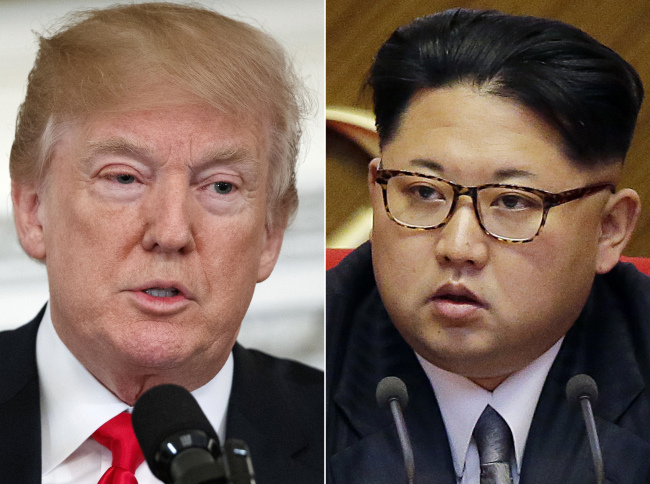Is there a ‘third option’ for resolving US-NK nuclear standoff?
By Yeo Jun-sukPublished : April 3, 2018 - 15:54
Ever since North Korea rattled the international community with nuclear and missile programs in the late 1990s, there have been two competing approaches to addressing Pyongyang’s relentless pursuit of nuclear ambition: incremental implementation and comprehensive denuclearization.
While the previous negotiations took an “incremental approach” in which North Korea made limited nuclear concessions in return for limited benefits from the US, the Trump administration denounces it as a delaying tactic to buy time and seeks to resolve the nuclear issue in a “comprehensive manner.”
South Korea’s Moon Jae-in administration, which is committed to playing a meditator role between Pyongyang and Washington, appears to believe there is a “third option” to meet both parties half way: incremental implementation for comprehensive denuclearization.
“Comprehensive and incremental approach is like the two sides of the same coin,” a Cheong Wa Dae official told reporters Tuesday under the customary condition of anonymity. “We start with a comprehensive agreement and implement it in a phased manner.”

Despite high hopes for North Korea’s diplomatic overtures that have led to the upcoming summits with South Korea and the US, skepticism persists over whether the efforts will lead to a complete dismantling of North Korea’s nuclear arsenal, as there have been previous failures at denuclearization.
Such views were bolstered after North Korea’s surprise summit with China last week. In Beijing, North Korea’s leader Kim Jong-un proposed a “phased, synchronized” move toward denuclearization -- the same approach the North insisted upon in past negotiations that the Trump administration views as a “failure.”
Cheong Wa Dae, however, insisted there is one major difference in the upcoming denuclearization. Unlike in the past, the new process will benefit from a top-down approach led by the two politically-motivated two leaders -- Kim and Trump.
“The upcoming denuclearization talks take top-down approaches. … So we can expect that an agreement will be reached more quickly and clearly. The way we verify the process could be more efficient,” said the Cheong Wa Dae official.
Introduced by Cheong Wa Dae last week and later echoed by the president’s special adviser Moon Chung-in, those ideas offered a glimpse into how the Moon administration will attempt to reconcile what appear to be two contrasting concepts -- incremental implementation and comprehensive denuclearization.
The key to success is incorporating the complicated implementation process into a “packaged phase” so that both the US and North Korea can make significant concessions during the initial phase of denuclearization talks, experts said.
Such “compressed implementation” is crucial to sustaining the rare denuclearization momentum created by North Korea’s participation in the PyeongChang Olympics and agreements to hold summits with South Korea and the US, they added.
“The main difference from the past negotiations is that it aims to implement each denuclearization phase in a compressed and irreversible manner. It’s like riding a bullet train to the denuclearization station,” said Kim Yeon-chul, a professor at Inje University, who served as an advisory member for the inter-Korean talks.

Echoing the idea is President Moon’s special adviser Moon Chung-in who, during a lecture at Waseda University in Japan on Monday, said that while the Moon and Trump administrations support efforts to strike a comprehensive nuclear deal, implementation of the agreement should take place step-by-step.
Such comments reflected a shift in the South Korean government’s approach to the upcoming denuclearization talks. Working in tandem with Washington, Seoul had appeared to advocate a Libyan-style comprehensive nuclear deal before Kim’s surprise visit to China.
Hours before President Moon was briefed about the outcome of the Kim-Xi summit by the Chinese leader’s envoy Yang Jiechi last Friday, Cheong Wa Dae said a Libyan-style approach could not be applied to the denuclearization talks with North Korea.
“I understand there are talks about a Libyan-style nuclear deal. But in fact, there are various phases along the way before striking a deal, such as the lifting of economic sanctions and establishing offices for contacts,” the Cheong Wa Dae officials said.
In late 2003, following nine months of secret talks with the US and Britain, then-Libya leader Muammar Gaddafi agreed to abandon his country’s entire nuclear arsenal. The components of the nuclear program were either destroyed or shipped to the US.
To lay the groundwork for the upcoming talks, the Moon administration is seeking to make a joint declaration for denuclearization with North Korea during the inter-Korean summit scheduled to take place on April 27 at the southern side of the truce-village of Panmunjeom.
By Yeo Jun-suk (jasonyeo@heraldcorp.com)






![[From the Scene] Monks, Buddhists hail return of remains of Buddhas](http://res.heraldm.com/phpwas/restmb_idxmake.php?idx=644&simg=/content/image/2024/04/19/20240419050617_0.jpg&u=20240419175937)







![[From the Scene] Monks, Buddhists hail return of remains of Buddhas](http://res.heraldm.com/phpwas/restmb_idxmake.php?idx=652&simg=/content/image/2024/04/19/20240419050617_0.jpg&u=20240419175937)

![[KH Explains] Hyundai's full hybrid edge to pay off amid slow transition to pure EVs](http://res.heraldm.com/phpwas/restmb_idxmake.php?idx=652&simg=/content/image/2024/04/18/20240418050645_0.jpg&u=20240419100350)

![[Today’s K-pop] Illit drops debut single remix](http://res.heraldm.com/phpwas/restmb_idxmake.php?idx=642&simg=/content/image/2024/04/19/20240419050612_0.jpg&u=)